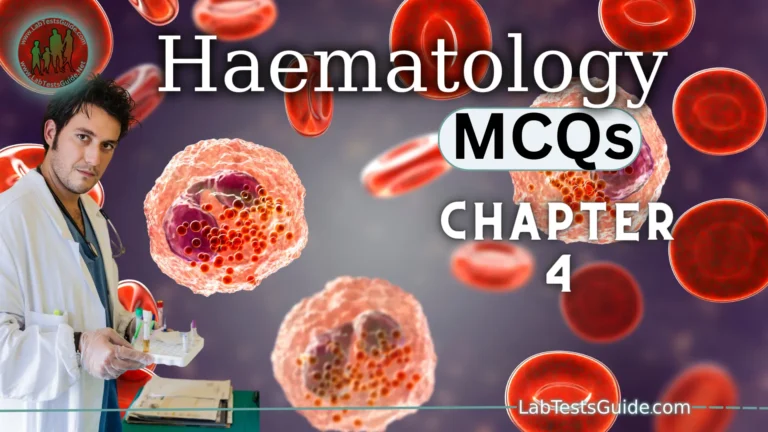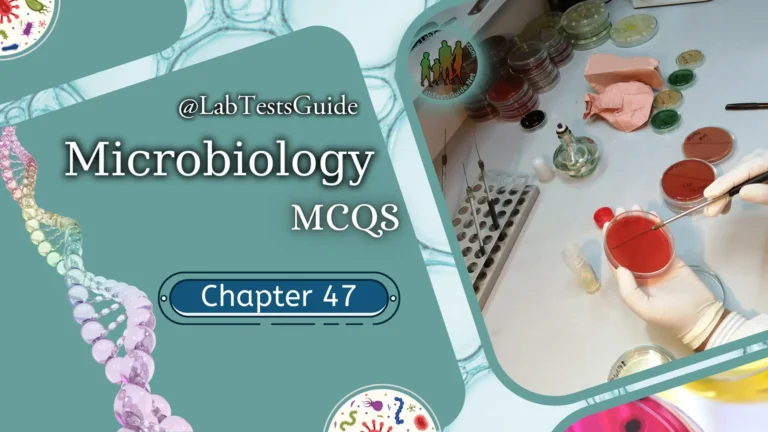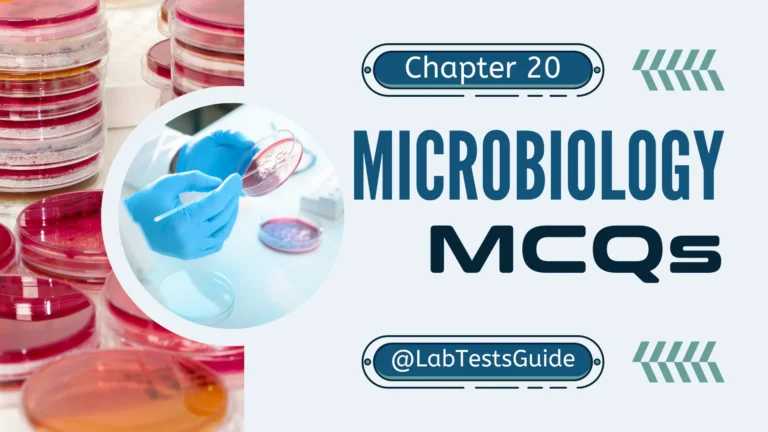5000 Plus MCQs for Lab Technician and Technologists are designed to test the knowledge and proficiency of laboratory professionals who work in the field of clinical laboratory science. These questions cover a wide range of topics related to laboratory science, including anatomy, physiology, microbiology, chemistry, and hematology.

401 to 450 MCQs for Lab Technician and Technologist Exam Preparation
If You like then share this to your friends and other social media.
If You have any question and suggestions then please Contact us Here
Questions 401 to 450
- Which one of the following develops the blood bank?
- Sir Alexander Godefroy
- Sir Charles Richard Drew ✔
- Sir John Biggins
- Sir Louis Braille
- Formation of blood cell is called:
- Mitosis
- Hemopoiesis ✔
- Photosynthesis
- Complement fixation
- During blood donation, the removal of blood components is called:
- Cytophresis
- Plasmaphresis
- Aphresis ✔
- Leakophresis
- In Sickle cell anemia, red cell count is :
- Reduced ✔
- Increased
- Normal
- None
- Size of red blood cell is:
- 10 micro meter
- 7 micro meter ✔
- 8 micro meter
- 2 micro meter
- The minimum weight of blood donor should be:
- 45kg
- 50kg ✔
- 55kg
- 60Kg
- The lower limit of Hb in female blood donor is:
- 10 gm/dl
- 12 gm/dl ✔
- 13 gm/dl
- 14 gm/dl
- The disease cannot be transmitted through transfusion of blood is:
- Hepatitis B
- AIDS
- Cancer ✔
- Malaria
- Red blood cells can be frozen and stored up to:
- 3 years ✔
- 5 years
- 7 years
- 8 years
- 500ml whole blood contains plasma approximately:
- 100 to 150ml
- 200 to 250ml ✔
- 300 to 350ml
- 350 to 400ml
- Immunological reactions of Blood transfusion include all except:
- Allergic
- Anaphylactic
- Leak agglutinin
- Circulatory overload ✔
- Primary reaction of Ag-Ab interaction is:
- Invisible ✔
- Visible
- pH dependent
- No reaction
- The conditions in which Bleeding time does not become prolonged is:
- Deficiency of vitamin K
- Hemophilia
- Thrombocytopenia
- Afibrinoginemia ✔
- Clotting time has normal value of:
- 2 to 8 min ✔
- 3 to 6 min
- 4 to 5 min
- 6 to 8 min
- The common Blood group among these is:
- AB-Negative
- B-Positive ✔
- A-Negative
- AB-Positive
- Donation of blood can cause:
- Malaria
- AIDS
- Hepatitis
- No disease ✔
- Whole blood is contraindicated except in:
- Chronic anemia
- Thrombocytopenia
- Exchange transfusion ✔
- Incipient Cardiac failure
- In embryonic life, the blood cell development stage is:
- Hepatic stage
- Mesoblastic stage ✔
- Myeloid stage
- Mature stage
- All coagulation factors are stable at low freezing point except:
- Factors V & VIII ✔
- Factors IX & X
- Factors IV &V
- Factors II
- The normal platelet count in adult is:
- 100,000 to 300,000 mm3
- 150,000 to 250,000 mm3
- 150,000 450,000 mm3 ✔
- 200,000 300,000 mm3
- In Blood, lack of intrinsic factors causes:
- Sickle cell anemia
- Pernicious anemia ✔
- Target cell anemia
- Iron deficiency anemia
- MC blood transfusion reaction is:
- Febrile non-hemolytic transfusion reaction ✔
- Hemolysisc
- Transmission of infections
- Electrolyte imbalance
- All of the following infections may be transmitted via bloodtransfusion, except:
- Parvo B-19
- Dengue virus ✔
- Hepatitis G
- Cytomegalovirus
- Which of the following is the least likely complication aermassive blood transfusion ?
- Hyperkalemia
- Citrate toxicity
- Hypothermia
- Metabolic acidosis ✔
- Fresh hold blood transfusion is done with in how much timeof collection ?
- Immediately
- 1 hours
- 4 hours
- 24 hours ✔
- Which of the following investigations should be doneimmediately to best confirm a non matched blood transfusionreaction ?
- Indirect Coomb’s test
- Direct Coomb’s test ✔
- Antibody in patient’s serum
- Antibody in donor serum
- Blood components products are:
- Whole blood
- Platelets
- Fresh frozen plasma
- Leukocyte reduced RBC
- All of the above ✔
- One unit of fresh blood arises the Hb% concentration by:
- 0.1 gm%
- 1 gm% ✔
- 2 gm%
- 2.2 gm%
- Which of the following statements about acute hemolytic blood transfusion reaction is true ?
- Complement mediated hemolysis is seen ✔
- Type III hypersensitivity is responsible for most cases
- Rarely life threatening
- Renal blood ow is always maintained
- No need for stopping transfusion
- True about blood transfusions:
- Antigen ‘D” determines Rh positivity ✔
- Febrile reaction is due to HLA antigens
- Anti-d is naturally occurring antibody
- Cryoprecipitate contains all coagulation factors
- Which of the following is better indicator of need fortransfusion ?
- Urine output
- Hematocrit ✔
- Colour of skin
- Clinical examination
- Massive blood transfusion is defined as:
- 350 ml in 5 min
- 500 ml in 5 min
- 1 litre in 5 min
- Whole blood volume ✔
- How long can blood stored with CPDA?
- 12 days
- 21 days
- 35 days ✔
- 48 days
- Massive transfusion in previous healthy adult male can cause hemorrhage due to:
- Increased t-PA
- Dilutional thrombocytopenia ✔
- Vitamin K deficiency
- Decreased Fibrinogen
- Arterial blood gas analysis in a bottle containing heparincauses a decrease in value of:
- pCO2
- HCO3
- pH
- All of the above ✔
- Massive blood transfusion is defined as:
- Whole blood volume in 24 hours ✔
- Half blood volume in 24 hours
- 40% blood volume in 24 hours
- 60% blood volume in 24 hours
- After blood transfusion the febrile non-hemolytic transfu-sion reaction (FNHTR) occurs due to ?
- Alloimmunization
- Antibodies against donor leukocytes and HLA Ag ✔
- Allergic reaction
- Anaphylaxis
- Blood grouping and cross-matching is must prior to infusionof:
- Gelatin
- Dextran ✔
- Albumin
- FFP
- Blood grouping and cross matching is must prior to infusionof:
- Gelatin
- Albumin
- Dextran ✔
- Hemaceal
- Collection of blood for cross matching and grouping is done before administration of which plasma expander ?
- Hydroxyl ethyl starch
- Dextran ✔
- Mannitol
- Hemacele
- Mismatched blood transfusion in anesthetic patient presentsis:
- Hyperthermia and hypertension
- Hypotension and bleeding from site of wound ✔
- Bradycardia and hypertension
- Tachycardia and hypertension
- What is Anticoagulant ?
- Liques which stop Bleeding
- Chemical which prevent bleeding
- Salt That allow Blood to clot
- All of above
- none of above ✔
- Most common Chemical that used as blood bank anticoagulant ?
- EDTA
- Heparin
- Tri-Sodium Citrate ✔
- Double Oxalate
- Advantage of blood donation to donor
- Free health Check up
- Reduce iron in body
- Decrease Heart disease
- All of above ✔
- Before 24 hour which type of donor avoide for donation ?
- Person who drunk Alcohol ✔
- Dental Extraction Patient
- Menstrual bleed women
- All of above
- Which needle used for blood donation ?
- 21g
- 10g
- 16g ✔
- 23g
- Which of the following not testing as a transfusion related infection in blood bank ?
- Hepatitis A ✔
- Malaria
- AIDS
- HIV
- 450 ml of blood require how much amount of anticoagulant ?
- 49ml
- 63ml ✔
- 50ml
- 36ml
- RH Blood grouping discoverd by ?
- Karl Landsteiner + Weiner ✔
- Weiner + Alexander Fleming
- Alexander Fleming
- Karl Landsteiner
- RH Antigen present on ?
- Chromosome 19
- Chromosome 1 ✔
- Chromosome 9
- Chromosome 16
The questions are typically designed to assess the technical skills and knowledge required for the laboratory profession, including the ability to analyze laboratory test results, perform laboratory procedures, and maintain laboratory equipment.
To prepare for these MCQs, candidates should have a thorough understanding of the key concepts and principles of laboratory science. They should also be familiar with common laboratory equipment and procedures, as well as laboratory safety protocols.
Candidates may also benefit from studying specific laboratory science textbooks or taking online courses that cover the material tested in the MCQs. Additionally, practicing sample MCQs and reviewing the answers can help candidates identify areas where they may need to improve their knowledge or skills.
Overall, the MCQs for lab technologists are designed to be challenging and comprehensive, requiring candidates to demonstrate a high level of proficiency in the field of laboratory science.
Possible References Used







